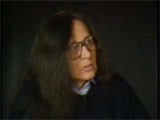
Oral History
Browse an alphabetical list of survivors’ oral histories. These interviews describe firsthand accounts and personal experiences during the Holocaust and World War II.
<< Previous | Displaying results 1-10 of 28 for "Oral History" | Next >>
-
Eddie Hellmuth Willner describes conditions in the Langenstein camp
Oral HistoryIn December 1939, Eddie's father sent Eddie to live with a family in Belgium, a safer place for Jews as it was not yet occupied by Germany. Later, while visiting his father in a camp in France, Eddie was detained. He and his father escaped, but were later deported. Eddie survived forced labor in a series of camps, and with his friend Mauritz "Michael" Swaab, escaped a death march from Langenstein, a Buchenwald subcamp. The two were liberated while on the run.
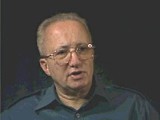
-
Edward Adler describes arrest and imprisonment in prewar Germany for his relationship with a non-Jewish woman
Oral HistoryEdward was born to a Jewish family in Hamburg. In 1935, the Nuremberg Laws prohibited marriage or sexual relations between German non-Jews and Jews. Edward was then in his mid-twenties. Edward was arrested for dating a non-Jewish woman. Classified as a habitual offender, he was later deported to the Sachsenhausen concentration camp, near Berlin. He was forced to perform hard labor in construction projects. Edward had married shortly before his imprisonment, and his wife made arrangements for their…
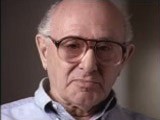
-
Edward Adler describes deportation to and arrival at the Sachsenhausen camp
Oral HistoryEdward was born to a Jewish family in Hamburg. In 1935, the Nuremberg Laws prohibited marriage or sexual relations between German non-Jews and Jews. Edward was then in his mid-twenties. Edward was arrested for dating a non-Jewish woman. Classified as a habitual offender, he was later deported to the Sachsenhausen concentration camp, near Berlin. He was forced to perform hard labor in construction projects. Edward had married shortly before his imprisonment, and his wife made arrangements for their…
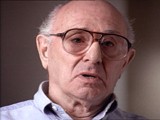
-
Edward Adler describes forced labor and conditions in the Sachsenhausen camp
Oral HistoryEdward was born to a Jewish family in Hamburg. In 1935, the Nuremberg Laws prohibited marriage or sexual relations between German non-Jews and Jews. Edward was then in his mid-twenties. Edward was arrested for dating a non-Jewish woman. Classified as a habitual offender, he was later deported to the Sachsenhausen concentration camp, near Berlin. He was forced to perform hard labor in construction projects. Edward had married shortly before his imprisonment, and his wife made arrangements for their…
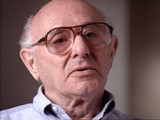
-
Edward Adler describes roundup and deportation to the town of Oranienburg, near the Sachsenhausen camp
Oral HistoryEdward was born to a Jewish family in Hamburg. In 1935, the Nuremberg Laws prohibited marriage or sexual relations between German non-Jews and Jews. Edward was then in his mid-twenties. Edward was arrested for dating a non-Jewish woman. Classified as a habitual offender, he was later deported to the Sachsenhausen concentration camp, near Berlin. He was forced to perform hard labor in construction projects. Edward had married shortly before his imprisonment, and his wife made arrangements for their…
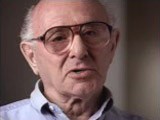
-
Edward Adler recalls forced labor and conditions in the Sachsenhausen camp
Oral HistorySeveral of the IMT defendants were charged with exploiting concentration camp inmates for forced labor under harsh conditions, like those described here by Holocaust survivor Edward Adler. Edward was born to a Jewish family in Hamburg. In 1935, the Nuremberg Laws prohibited marriage or sexual relations between German non-Jews and Jews. Edward was then in his mid-twenties. Edward was arrested for dating a non-Jewish woman. Classified as a habitual offender, he was later deported to the Sachsenhausen…

-
Edward Lessing describes wearing the compulsory Jewish badge.
Oral HistoryEdward was born to a Jewish family in The Hague. In 1929, the family moved to the United States. Because his father had difficulty finding employment, Edward and his family returned to the Netherlands in 1932. They were living in the town of Delft and running a small clothing store when war broke out. Germany invaded the Netherlands in May 1940. Anti-Jewish decrees were instituted, increasing in severity to the point that Jews could no longer own businesses and were forced to wear a yellow badge after May…
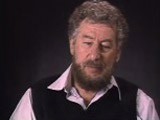
-
Edward Weiss describes Dachau shortly after the liberation
Oral HistoryGI Edward S. Weiss, a resident of Gaithersburg, Maryland, was at the Dachau concentration camp shortly after its liberation.
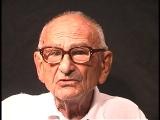
-
Edwarda Kleinfeld Rorat describes emotions upon liberation
Oral HistoryAfter the German invasion in 1939, Edwarda and her family left Warsaw and moved to a small village near Lublin. Her parents were murdered by German soldiers in 1942. Edwarda was eventually taken in by the Rorat family. The Rorats owned a village store. She lived under their protection throughout the war and continued to live with them after liberation. She completed her education in Poland and later immigrated to the United States.
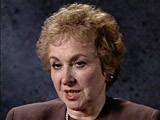
-
Elizabeth Kaufmann Koenig describes helping refugee children in Le Chambon
Oral HistoryElizabeth and her family were in Paris when war began. As the Germans advanced in 1940, she and her mother fled southward. Elizabeth eventually reached Le Chambon, where she helped care for children sheltered by the town's pastor, Andre Trocme, and his wife. In late 1941 her father was among 1,000 intellectuals who received special US visas from President Franklin D. Roosevelt. The family escaped from France in 1942 on one of the last passenger ships to cross the Atlantic during the war.
